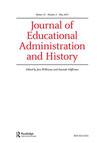Vox Poetica: bringing an arts-based research method to school leaders’ lockdown experiences
IF 1.6
Q2 EDUCATION & EDUCATIONAL RESEARCH
Journal of Educational Administration and History
Pub Date : 2022-05-05
DOI:10.1080/00220620.2022.2071849
引用次数: 0
Abstract
ABSTRACT The work of school leaders during lockdown has been emotionally charged and emotionally draining, affecting immediate well-being and longer term career plans. To communicate the emotions that we were told about and which were obvious during interviews with serving headteachers, we turned to arts-informed methods. We used poems made from transcripts to complement and supplement the analysis of 58 interviews and survey responses (n = 1491). This paper introduces the use of transcript poetry and explains our choice of method. The poems foreground the diversity that existed among the leaders, and different kinds of interventions that might make a difference. Our example suggests that the educational leadership, management and administration field might benefit from further experimentation with arts-based methods.Vox Poetica:将基于艺术的研究方法引入学校领导的禁闭经历
在封锁期间,学校领导的工作让人情绪紧张,情绪枯竭,影响了眼前的幸福感和长期的职业规划。为了传达我们被告知的情绪,这些情绪在对现任校长的采访中很明显,我们转向了艺术知情的方法。我们使用抄写的诗歌来补充和补充58个访谈和调查回复的分析(n = 1491)。本文介绍了抄本诗歌的使用,并说明了我们选择的方法。这些诗歌突出了领导人之间存在的多样性,以及可能产生影响的不同干预措施。我们的例子表明,教育领导、管理和行政领域可能会从以艺术为基础的方法的进一步实验中受益。
本文章由计算机程序翻译,如有差异,请以英文原文为准。
求助全文
约1分钟内获得全文
求助全文
来源期刊

Journal of Educational Administration and History
EDUCATION & EDUCATIONAL RESEARCH-
CiteScore
3.80
自引率
5.60%
发文量
25
 求助内容:
求助内容: 应助结果提醒方式:
应助结果提醒方式:


